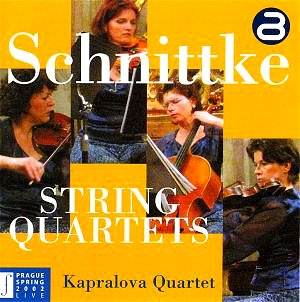Perspective, perspective. Hearing these four
works gives the listener just that. The contrast between the Third
Quartet and the other works is brutal.
We start however with the unrepentant and unrelieved
avant-garderie of Schnittke's 1966 First Quartet written
at the suggestion of Rostislav Dubinsky. Unlike the Kubin first
quartet (also on Arco Diva
review) this is rigorously serial and while no doubt
ingenious in construction its passionate discordant sighs and
plunk-plinks bring little reward to the generalist listener. The
party apparatus condemned the work as anti-Soviet which in some
quarters these days should per se guarantee it plenty of
exposure.
The Third Quartet is more approachable
with its use of the harmonic adventures of di Lasso and Gesualdo
in the two outer movements and Beethoven in the central agitato.
Shostakovich's brimming ratcheted tension is evident in the finale
alongside the di Lasso. While it becomes more expressively abstruse
in the finale the ideas are connected and a sense of narrative
flow exists even if it does end in exhausted negation.
The Fourth Quartet was written following
the composer's emergence from a series of strokes. It is his longest
quartet at approaching 37 minutes and was completed a month or
so before his departure from Moscow to Hamburg where he spent
his last years eventually in complete paralysis. It is a fairly
bleak piece of writing as may be expected. While it avoids the
discontinuity of the First Quartet it remains a radical mix that
will suit only the hardiest of musical travellers. The longest
movement is the last.
Also uncompromising and much closer to the First
Quartet is the Stravinsky Canon with its long-held
notes, note-slaloms and quiet dynamics throughout.
The all-female Kapralova Quartet, who have by
the way recorded their namesake's quartet, engage urgently and
with convincing technical command with Schnittke's demanding creativity.
The recording is exemplary. The notes are well done - very helpful
in preparing this review.
Rob Barnett
The
Arcodiva catalogue is now offered by MusicWeb

![]() for
details
for
details